UNCC: Analyzing Ethics of Clothing Production and Common Good
VerifiedAdded on 2020/03/04
|7
|2015
|62
Essay
AI Summary
This essay provides a critique of the ethics of clothing production, focusing on its impact on the common good. It explores challenges such as the exploitation of workers, poor working conditions, and the lack of community engagement and advocacy within the industry. Drawing on Catholic social teaching principles, the essay highlights the importance of human dignity, worker rights, and solidarity. It examines real-world examples, such as the collapse of a clothing factory in Bangladesh, to illustrate the consequences of unethical practices. The essay emphasizes the need for community participation, ethical leadership, and the role of labor unions and advocacy in ensuring fair labor practices and a sustainable environment. It concludes by stressing the importance of upholding ethical standards in the clothing industry to achieve a just society.
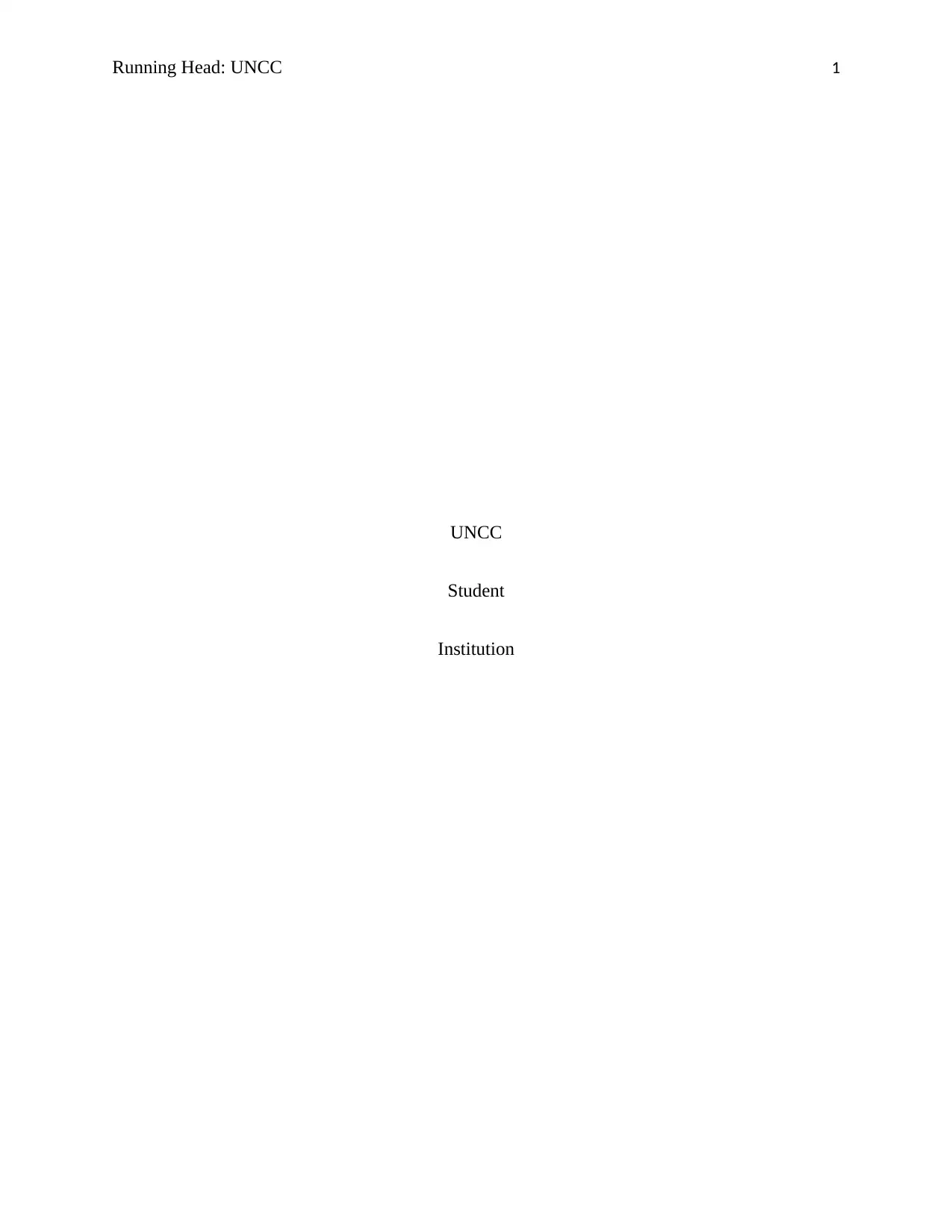
Running Head: UNCC 1
UNCC
Student
Institution
UNCC
Student
Institution
Paraphrase This Document
Need a fresh take? Get an instant paraphrase of this document with our AI Paraphraser
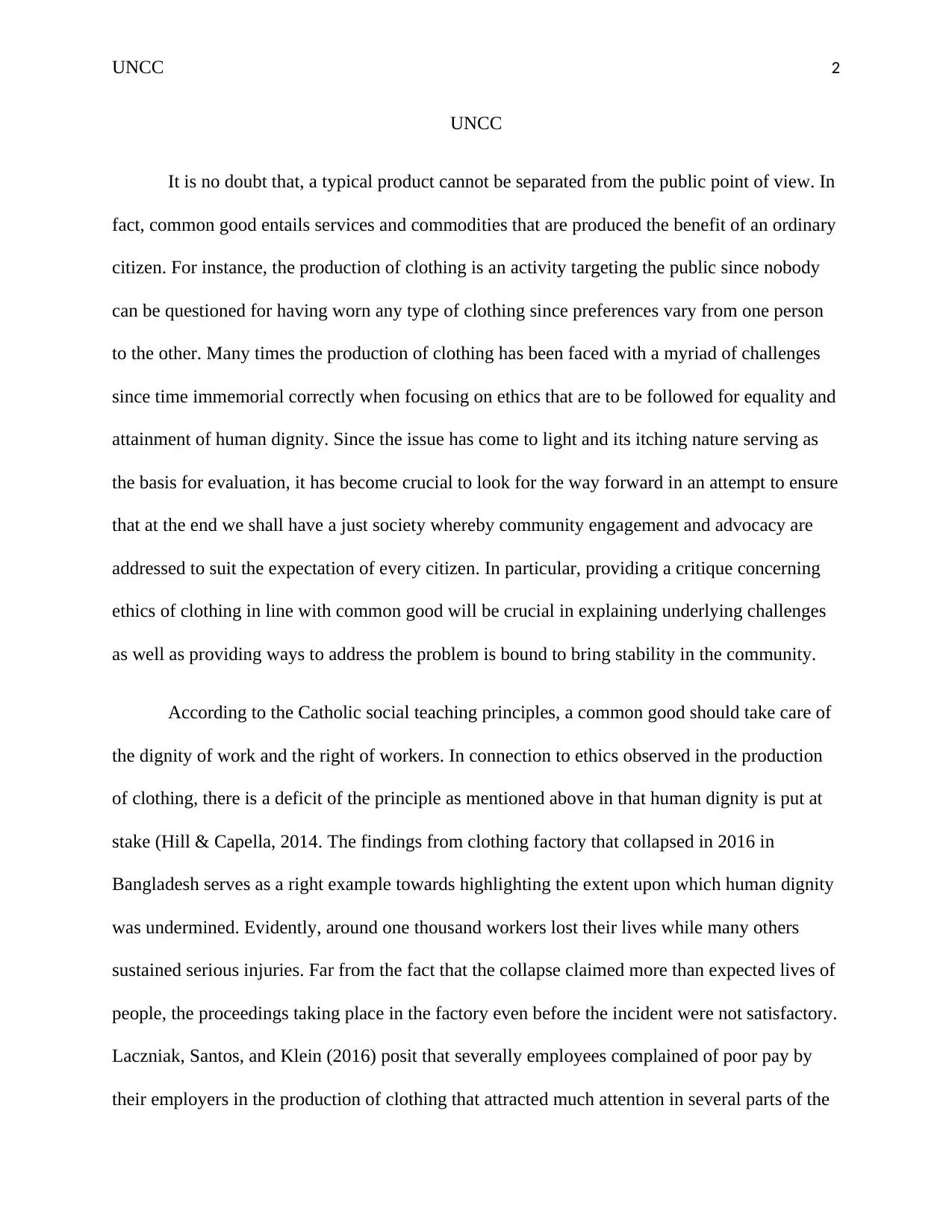
UNCC 2
UNCC
It is no doubt that, a typical product cannot be separated from the public point of view. In
fact, common good entails services and commodities that are produced the benefit of an ordinary
citizen. For instance, the production of clothing is an activity targeting the public since nobody
can be questioned for having worn any type of clothing since preferences vary from one person
to the other. Many times the production of clothing has been faced with a myriad of challenges
since time immemorial correctly when focusing on ethics that are to be followed for equality and
attainment of human dignity. Since the issue has come to light and its itching nature serving as
the basis for evaluation, it has become crucial to look for the way forward in an attempt to ensure
that at the end we shall have a just society whereby community engagement and advocacy are
addressed to suit the expectation of every citizen. In particular, providing a critique concerning
ethics of clothing in line with common good will be crucial in explaining underlying challenges
as well as providing ways to address the problem is bound to bring stability in the community.
According to the Catholic social teaching principles, a common good should take care of
the dignity of work and the right of workers. In connection to ethics observed in the production
of clothing, there is a deficit of the principle as mentioned above in that human dignity is put at
stake (Hill & Capella, 2014. The findings from clothing factory that collapsed in 2016 in
Bangladesh serves as a right example towards highlighting the extent upon which human dignity
was undermined. Evidently, around one thousand workers lost their lives while many others
sustained serious injuries. Far from the fact that the collapse claimed more than expected lives of
people, the proceedings taking place in the factory even before the incident were not satisfactory.
Laczniak, Santos, and Klein (2016) posit that severally employees complained of poor pay by
their employers in the production of clothing that attracted much attention in several parts of the
UNCC
It is no doubt that, a typical product cannot be separated from the public point of view. In
fact, common good entails services and commodities that are produced the benefit of an ordinary
citizen. For instance, the production of clothing is an activity targeting the public since nobody
can be questioned for having worn any type of clothing since preferences vary from one person
to the other. Many times the production of clothing has been faced with a myriad of challenges
since time immemorial correctly when focusing on ethics that are to be followed for equality and
attainment of human dignity. Since the issue has come to light and its itching nature serving as
the basis for evaluation, it has become crucial to look for the way forward in an attempt to ensure
that at the end we shall have a just society whereby community engagement and advocacy are
addressed to suit the expectation of every citizen. In particular, providing a critique concerning
ethics of clothing in line with common good will be crucial in explaining underlying challenges
as well as providing ways to address the problem is bound to bring stability in the community.
According to the Catholic social teaching principles, a common good should take care of
the dignity of work and the right of workers. In connection to ethics observed in the production
of clothing, there is a deficit of the principle as mentioned above in that human dignity is put at
stake (Hill & Capella, 2014. The findings from clothing factory that collapsed in 2016 in
Bangladesh serves as a right example towards highlighting the extent upon which human dignity
was undermined. Evidently, around one thousand workers lost their lives while many others
sustained serious injuries. Far from the fact that the collapse claimed more than expected lives of
people, the proceedings taking place in the factory even before the incident were not satisfactory.
Laczniak, Santos, and Klein (2016) posit that severally employees complained of poor pay by
their employers in the production of clothing that attracted much attention in several parts of the
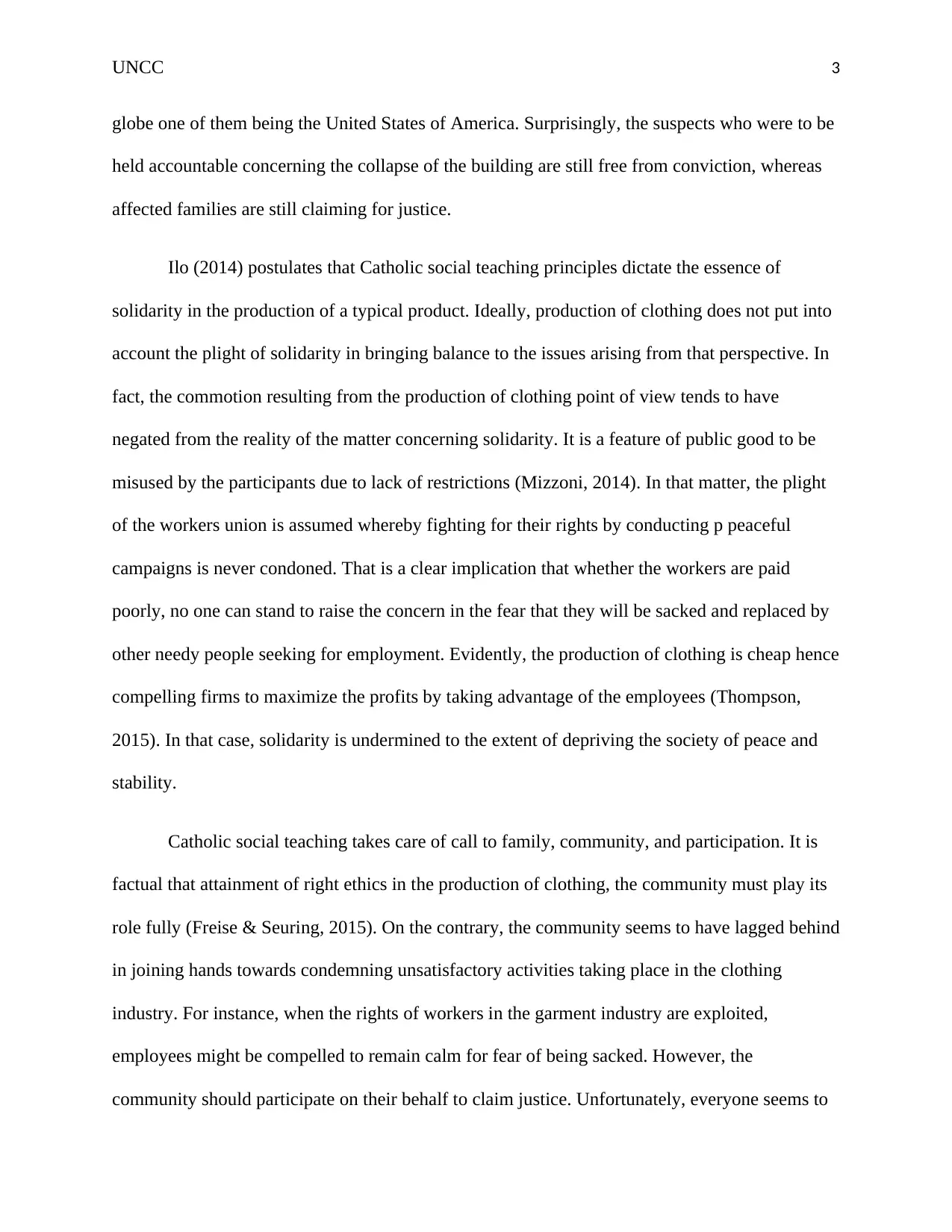
UNCC 3
globe one of them being the United States of America. Surprisingly, the suspects who were to be
held accountable concerning the collapse of the building are still free from conviction, whereas
affected families are still claiming for justice.
Ilo (2014) postulates that Catholic social teaching principles dictate the essence of
solidarity in the production of a typical product. Ideally, production of clothing does not put into
account the plight of solidarity in bringing balance to the issues arising from that perspective. In
fact, the commotion resulting from the production of clothing point of view tends to have
negated from the reality of the matter concerning solidarity. It is a feature of public good to be
misused by the participants due to lack of restrictions (Mizzoni, 2014). In that matter, the plight
of the workers union is assumed whereby fighting for their rights by conducting p peaceful
campaigns is never condoned. That is a clear implication that whether the workers are paid
poorly, no one can stand to raise the concern in the fear that they will be sacked and replaced by
other needy people seeking for employment. Evidently, the production of clothing is cheap hence
compelling firms to maximize the profits by taking advantage of the employees (Thompson,
2015). In that case, solidarity is undermined to the extent of depriving the society of peace and
stability.
Catholic social teaching takes care of call to family, community, and participation. It is
factual that attainment of right ethics in the production of clothing, the community must play its
role fully (Freise & Seuring, 2015). On the contrary, the community seems to have lagged behind
in joining hands towards condemning unsatisfactory activities taking place in the clothing
industry. For instance, when the rights of workers in the garment industry are exploited,
employees might be compelled to remain calm for fear of being sacked. However, the
community should participate on their behalf to claim justice. Unfortunately, everyone seems to
globe one of them being the United States of America. Surprisingly, the suspects who were to be
held accountable concerning the collapse of the building are still free from conviction, whereas
affected families are still claiming for justice.
Ilo (2014) postulates that Catholic social teaching principles dictate the essence of
solidarity in the production of a typical product. Ideally, production of clothing does not put into
account the plight of solidarity in bringing balance to the issues arising from that perspective. In
fact, the commotion resulting from the production of clothing point of view tends to have
negated from the reality of the matter concerning solidarity. It is a feature of public good to be
misused by the participants due to lack of restrictions (Mizzoni, 2014). In that matter, the plight
of the workers union is assumed whereby fighting for their rights by conducting p peaceful
campaigns is never condoned. That is a clear implication that whether the workers are paid
poorly, no one can stand to raise the concern in the fear that they will be sacked and replaced by
other needy people seeking for employment. Evidently, the production of clothing is cheap hence
compelling firms to maximize the profits by taking advantage of the employees (Thompson,
2015). In that case, solidarity is undermined to the extent of depriving the society of peace and
stability.
Catholic social teaching takes care of call to family, community, and participation. It is
factual that attainment of right ethics in the production of clothing, the community must play its
role fully (Freise & Seuring, 2015). On the contrary, the community seems to have lagged behind
in joining hands towards condemning unsatisfactory activities taking place in the clothing
industry. For instance, when the rights of workers in the garment industry are exploited,
employees might be compelled to remain calm for fear of being sacked. However, the
community should participate on their behalf to claim justice. Unfortunately, everyone seems to
⊘ This is a preview!⊘
Do you want full access?
Subscribe today to unlock all pages.

Trusted by 1+ million students worldwide
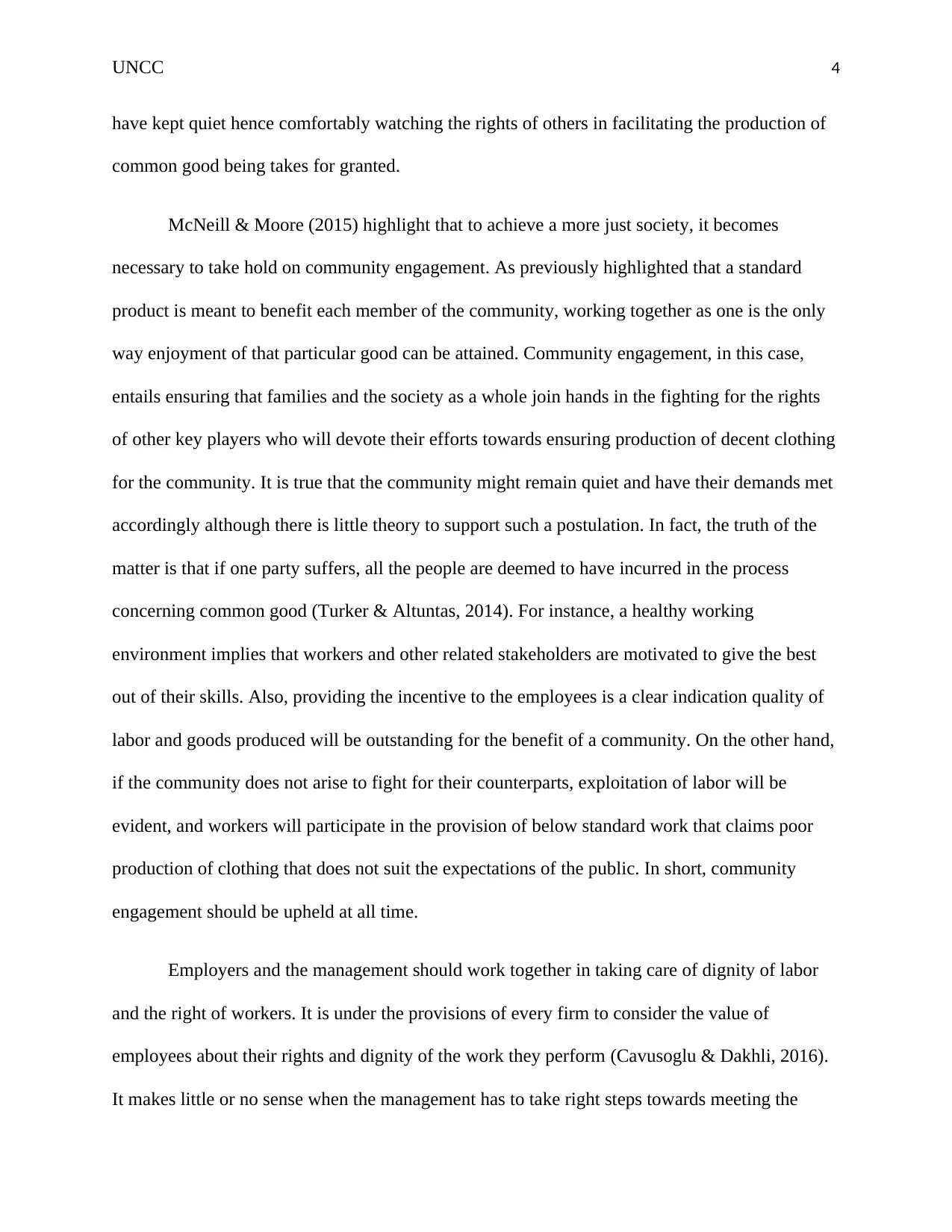
UNCC 4
have kept quiet hence comfortably watching the rights of others in facilitating the production of
common good being takes for granted.
McNeill & Moore (2015) highlight that to achieve a more just society, it becomes
necessary to take hold on community engagement. As previously highlighted that a standard
product is meant to benefit each member of the community, working together as one is the only
way enjoyment of that particular good can be attained. Community engagement, in this case,
entails ensuring that families and the society as a whole join hands in the fighting for the rights
of other key players who will devote their efforts towards ensuring production of decent clothing
for the community. It is true that the community might remain quiet and have their demands met
accordingly although there is little theory to support such a postulation. In fact, the truth of the
matter is that if one party suffers, all the people are deemed to have incurred in the process
concerning common good (Turker & Altuntas, 2014). For instance, a healthy working
environment implies that workers and other related stakeholders are motivated to give the best
out of their skills. Also, providing the incentive to the employees is a clear indication quality of
labor and goods produced will be outstanding for the benefit of a community. On the other hand,
if the community does not arise to fight for their counterparts, exploitation of labor will be
evident, and workers will participate in the provision of below standard work that claims poor
production of clothing that does not suit the expectations of the public. In short, community
engagement should be upheld at all time.
Employers and the management should work together in taking care of dignity of labor
and the right of workers. It is under the provisions of every firm to consider the value of
employees about their rights and dignity of the work they perform (Cavusoglu & Dakhli, 2016).
It makes little or no sense when the management has to take right steps towards meeting the
have kept quiet hence comfortably watching the rights of others in facilitating the production of
common good being takes for granted.
McNeill & Moore (2015) highlight that to achieve a more just society, it becomes
necessary to take hold on community engagement. As previously highlighted that a standard
product is meant to benefit each member of the community, working together as one is the only
way enjoyment of that particular good can be attained. Community engagement, in this case,
entails ensuring that families and the society as a whole join hands in the fighting for the rights
of other key players who will devote their efforts towards ensuring production of decent clothing
for the community. It is true that the community might remain quiet and have their demands met
accordingly although there is little theory to support such a postulation. In fact, the truth of the
matter is that if one party suffers, all the people are deemed to have incurred in the process
concerning common good (Turker & Altuntas, 2014). For instance, a healthy working
environment implies that workers and other related stakeholders are motivated to give the best
out of their skills. Also, providing the incentive to the employees is a clear indication quality of
labor and goods produced will be outstanding for the benefit of a community. On the other hand,
if the community does not arise to fight for their counterparts, exploitation of labor will be
evident, and workers will participate in the provision of below standard work that claims poor
production of clothing that does not suit the expectations of the public. In short, community
engagement should be upheld at all time.
Employers and the management should work together in taking care of dignity of labor
and the right of workers. It is under the provisions of every firm to consider the value of
employees about their rights and dignity of the work they perform (Cavusoglu & Dakhli, 2016).
It makes little or no sense when the management has to take right steps towards meeting the
Paraphrase This Document
Need a fresh take? Get an instant paraphrase of this document with our AI Paraphraser
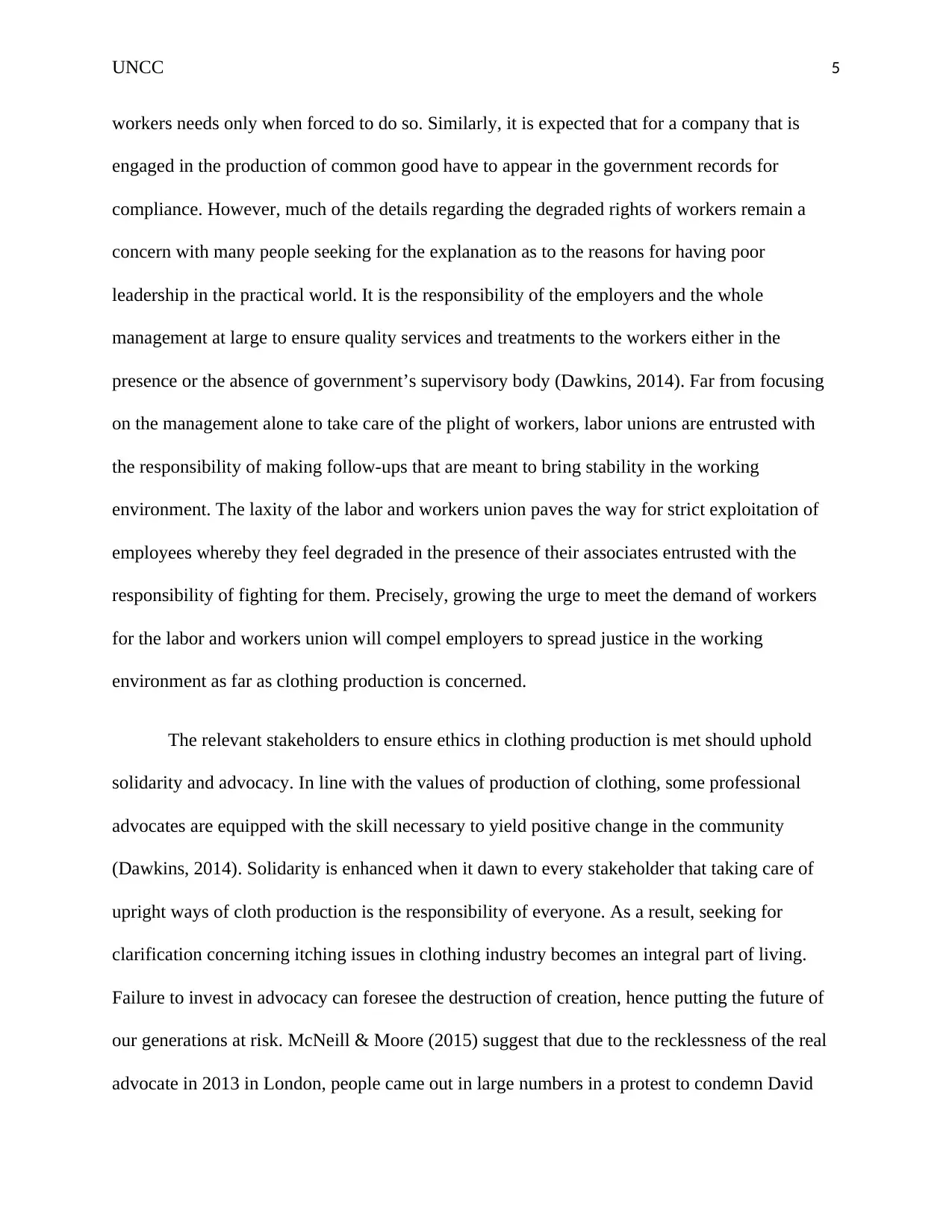
UNCC 5
workers needs only when forced to do so. Similarly, it is expected that for a company that is
engaged in the production of common good have to appear in the government records for
compliance. However, much of the details regarding the degraded rights of workers remain a
concern with many people seeking for the explanation as to the reasons for having poor
leadership in the practical world. It is the responsibility of the employers and the whole
management at large to ensure quality services and treatments to the workers either in the
presence or the absence of government’s supervisory body (Dawkins, 2014). Far from focusing
on the management alone to take care of the plight of workers, labor unions are entrusted with
the responsibility of making follow-ups that are meant to bring stability in the working
environment. The laxity of the labor and workers union paves the way for strict exploitation of
employees whereby they feel degraded in the presence of their associates entrusted with the
responsibility of fighting for them. Precisely, growing the urge to meet the demand of workers
for the labor and workers union will compel employers to spread justice in the working
environment as far as clothing production is concerned.
The relevant stakeholders to ensure ethics in clothing production is met should uphold
solidarity and advocacy. In line with the values of production of clothing, some professional
advocates are equipped with the skill necessary to yield positive change in the community
(Dawkins, 2014). Solidarity is enhanced when it dawn to every stakeholder that taking care of
upright ways of cloth production is the responsibility of everyone. As a result, seeking for
clarification concerning itching issues in clothing industry becomes an integral part of living.
Failure to invest in advocacy can foresee the destruction of creation, hence putting the future of
our generations at risk. McNeill & Moore (2015) suggest that due to the recklessness of the real
advocate in 2013 in London, people came out in large numbers in a protest to condemn David
workers needs only when forced to do so. Similarly, it is expected that for a company that is
engaged in the production of common good have to appear in the government records for
compliance. However, much of the details regarding the degraded rights of workers remain a
concern with many people seeking for the explanation as to the reasons for having poor
leadership in the practical world. It is the responsibility of the employers and the whole
management at large to ensure quality services and treatments to the workers either in the
presence or the absence of government’s supervisory body (Dawkins, 2014). Far from focusing
on the management alone to take care of the plight of workers, labor unions are entrusted with
the responsibility of making follow-ups that are meant to bring stability in the working
environment. The laxity of the labor and workers union paves the way for strict exploitation of
employees whereby they feel degraded in the presence of their associates entrusted with the
responsibility of fighting for them. Precisely, growing the urge to meet the demand of workers
for the labor and workers union will compel employers to spread justice in the working
environment as far as clothing production is concerned.
The relevant stakeholders to ensure ethics in clothing production is met should uphold
solidarity and advocacy. In line with the values of production of clothing, some professional
advocates are equipped with the skill necessary to yield positive change in the community
(Dawkins, 2014). Solidarity is enhanced when it dawn to every stakeholder that taking care of
upright ways of cloth production is the responsibility of everyone. As a result, seeking for
clarification concerning itching issues in clothing industry becomes an integral part of living.
Failure to invest in advocacy can foresee the destruction of creation, hence putting the future of
our generations at risk. McNeill & Moore (2015) suggest that due to the recklessness of the real
advocate in 2013 in London, people came out in large numbers in a protest to condemn David
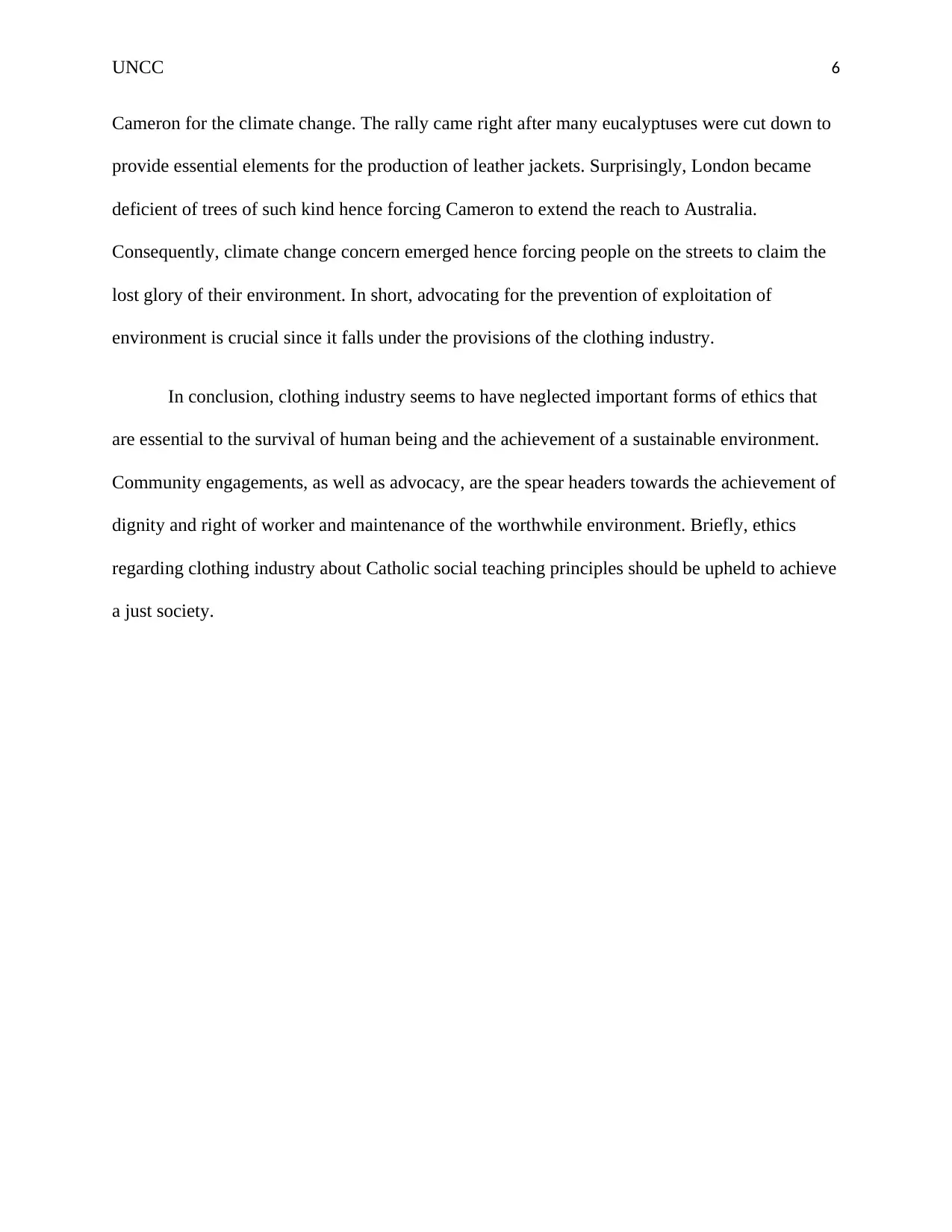
UNCC 6
Cameron for the climate change. The rally came right after many eucalyptuses were cut down to
provide essential elements for the production of leather jackets. Surprisingly, London became
deficient of trees of such kind hence forcing Cameron to extend the reach to Australia.
Consequently, climate change concern emerged hence forcing people on the streets to claim the
lost glory of their environment. In short, advocating for the prevention of exploitation of
environment is crucial since it falls under the provisions of the clothing industry.
In conclusion, clothing industry seems to have neglected important forms of ethics that
are essential to the survival of human being and the achievement of a sustainable environment.
Community engagements, as well as advocacy, are the spear headers towards the achievement of
dignity and right of worker and maintenance of the worthwhile environment. Briefly, ethics
regarding clothing industry about Catholic social teaching principles should be upheld to achieve
a just society.
Cameron for the climate change. The rally came right after many eucalyptuses were cut down to
provide essential elements for the production of leather jackets. Surprisingly, London became
deficient of trees of such kind hence forcing Cameron to extend the reach to Australia.
Consequently, climate change concern emerged hence forcing people on the streets to claim the
lost glory of their environment. In short, advocating for the prevention of exploitation of
environment is crucial since it falls under the provisions of the clothing industry.
In conclusion, clothing industry seems to have neglected important forms of ethics that
are essential to the survival of human being and the achievement of a sustainable environment.
Community engagements, as well as advocacy, are the spear headers towards the achievement of
dignity and right of worker and maintenance of the worthwhile environment. Briefly, ethics
regarding clothing industry about Catholic social teaching principles should be upheld to achieve
a just society.
⊘ This is a preview!⊘
Do you want full access?
Subscribe today to unlock all pages.

Trusted by 1+ million students worldwide
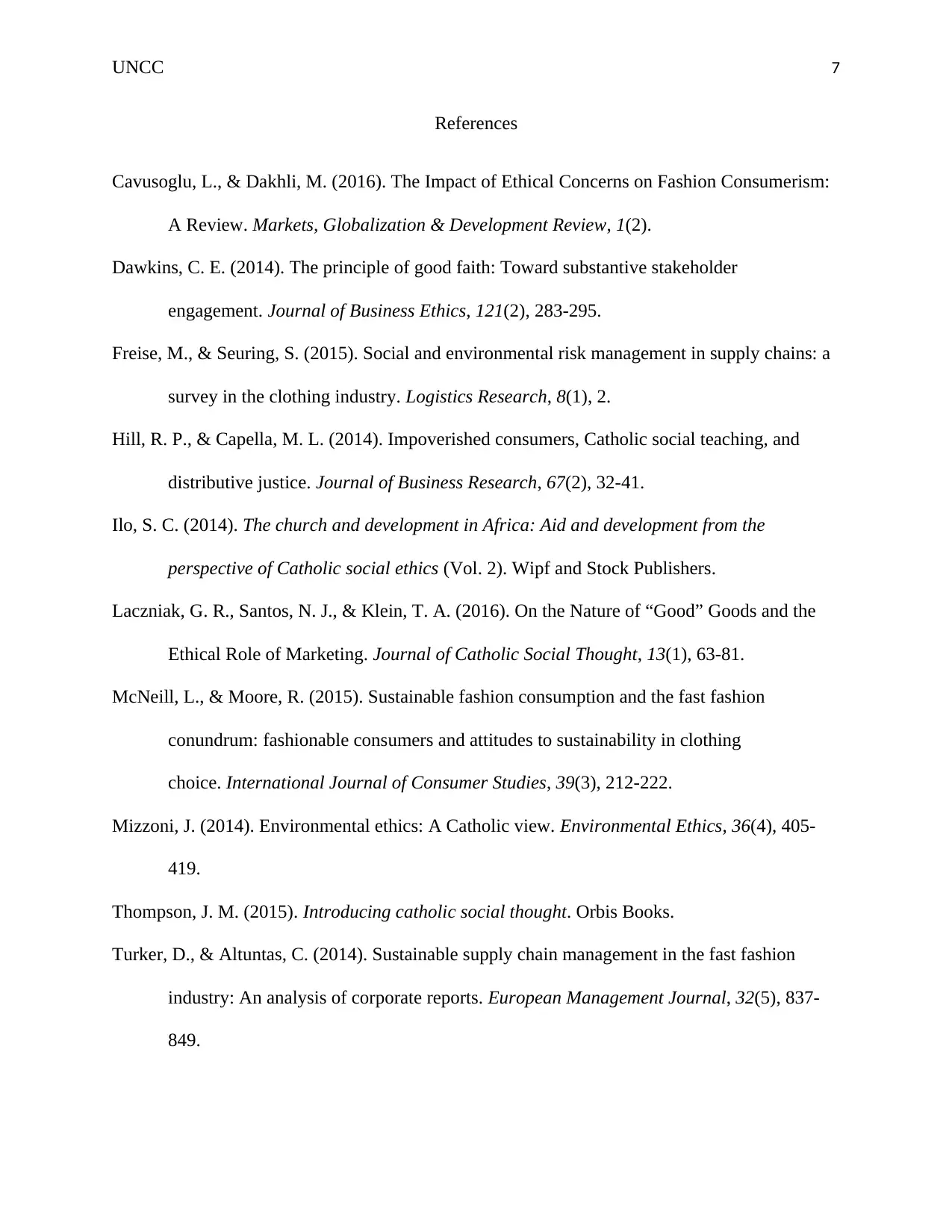
UNCC 7
References
Cavusoglu, L., & Dakhli, M. (2016). The Impact of Ethical Concerns on Fashion Consumerism:
A Review. Markets, Globalization & Development Review, 1(2).
Dawkins, C. E. (2014). The principle of good faith: Toward substantive stakeholder
engagement. Journal of Business Ethics, 121(2), 283-295.
Freise, M., & Seuring, S. (2015). Social and environmental risk management in supply chains: a
survey in the clothing industry. Logistics Research, 8(1), 2.
Hill, R. P., & Capella, M. L. (2014). Impoverished consumers, Catholic social teaching, and
distributive justice. Journal of Business Research, 67(2), 32-41.
Ilo, S. C. (2014). The church and development in Africa: Aid and development from the
perspective of Catholic social ethics (Vol. 2). Wipf and Stock Publishers.
Laczniak, G. R., Santos, N. J., & Klein, T. A. (2016). On the Nature of “Good” Goods and the
Ethical Role of Marketing. Journal of Catholic Social Thought, 13(1), 63-81.
McNeill, L., & Moore, R. (2015). Sustainable fashion consumption and the fast fashion
conundrum: fashionable consumers and attitudes to sustainability in clothing
choice. International Journal of Consumer Studies, 39(3), 212-222.
Mizzoni, J. (2014). Environmental ethics: A Catholic view. Environmental Ethics, 36(4), 405-
419.
Thompson, J. M. (2015). Introducing catholic social thought. Orbis Books.
Turker, D., & Altuntas, C. (2014). Sustainable supply chain management in the fast fashion
industry: An analysis of corporate reports. European Management Journal, 32(5), 837-
849.
References
Cavusoglu, L., & Dakhli, M. (2016). The Impact of Ethical Concerns on Fashion Consumerism:
A Review. Markets, Globalization & Development Review, 1(2).
Dawkins, C. E. (2014). The principle of good faith: Toward substantive stakeholder
engagement. Journal of Business Ethics, 121(2), 283-295.
Freise, M., & Seuring, S. (2015). Social and environmental risk management in supply chains: a
survey in the clothing industry. Logistics Research, 8(1), 2.
Hill, R. P., & Capella, M. L. (2014). Impoverished consumers, Catholic social teaching, and
distributive justice. Journal of Business Research, 67(2), 32-41.
Ilo, S. C. (2014). The church and development in Africa: Aid and development from the
perspective of Catholic social ethics (Vol. 2). Wipf and Stock Publishers.
Laczniak, G. R., Santos, N. J., & Klein, T. A. (2016). On the Nature of “Good” Goods and the
Ethical Role of Marketing. Journal of Catholic Social Thought, 13(1), 63-81.
McNeill, L., & Moore, R. (2015). Sustainable fashion consumption and the fast fashion
conundrum: fashionable consumers and attitudes to sustainability in clothing
choice. International Journal of Consumer Studies, 39(3), 212-222.
Mizzoni, J. (2014). Environmental ethics: A Catholic view. Environmental Ethics, 36(4), 405-
419.
Thompson, J. M. (2015). Introducing catholic social thought. Orbis Books.
Turker, D., & Altuntas, C. (2014). Sustainable supply chain management in the fast fashion
industry: An analysis of corporate reports. European Management Journal, 32(5), 837-
849.
1 out of 7
Related Documents
Your All-in-One AI-Powered Toolkit for Academic Success.
+13062052269
info@desklib.com
Available 24*7 on WhatsApp / Email
![[object Object]](/_next/static/media/star-bottom.7253800d.svg)
Unlock your academic potential
Copyright © 2020–2026 A2Z Services. All Rights Reserved. Developed and managed by ZUCOL.




